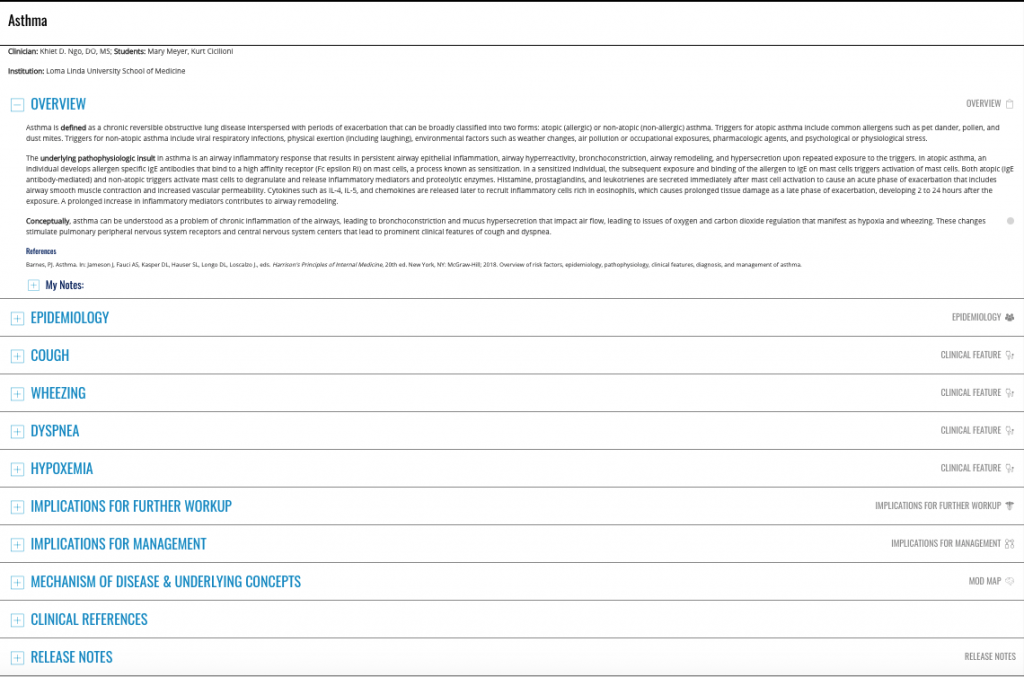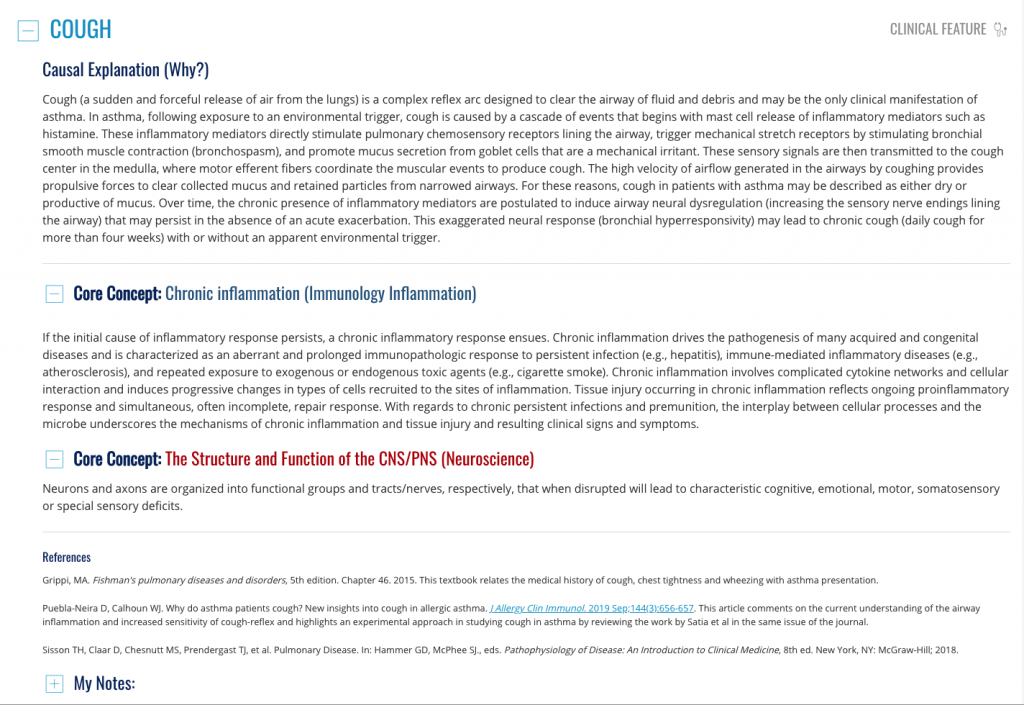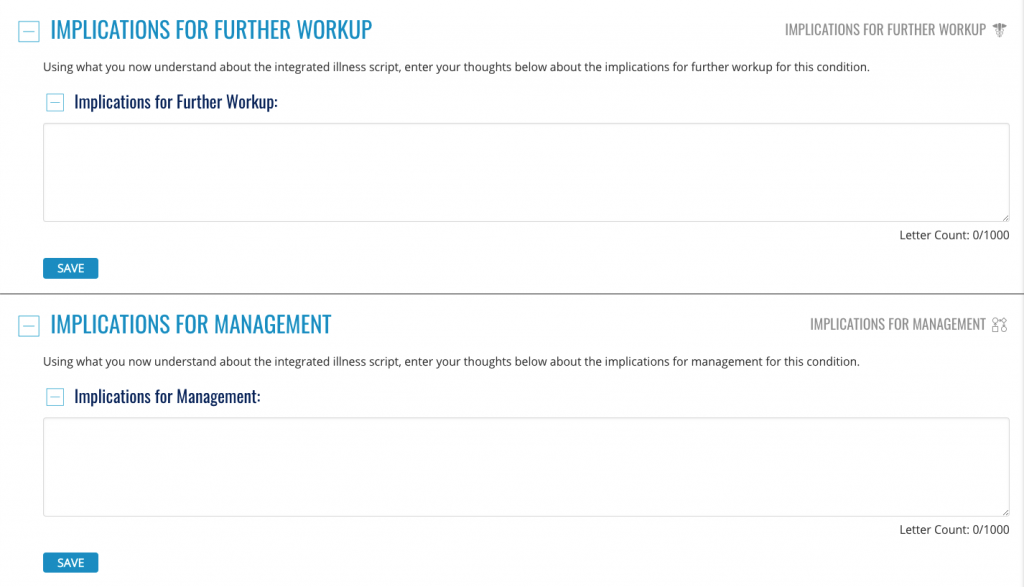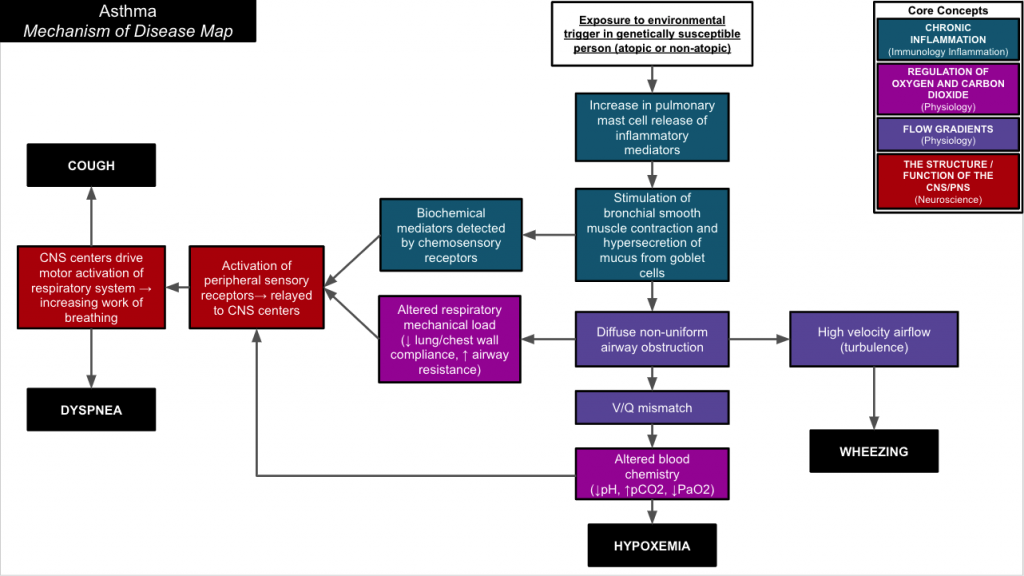
Available for Aquifer Curricular Partners & Individual Subscribers
Integrated Illness Scripts are designed specifically to promote cognitive integration and provide a framework for learners to link basic science and clinical knowledge. Building on the traditional illness script format, Integrated Illness Scripts (IIS) embed basic science core concepts and causal mechanisms within each clinical feature and display the connections visually through Mechanism of Disease Maps.
Making Connections for Deeper Understanding & Better Clinical Decisions
Bringing together clinical features, epidemiology, and basic science causal mechanisms and core concepts, Integrated Illness Scripts provide a new mental model for advancing cognitive integration in learners and unpacking encapsulated expertise from faculty. This new framework is designed to enable more effective and efficient clinical decision-making.
Designed for Integration
The first tools designed specifically for integrating basic and clinical sciences in a variety of learning environments.
For Educators, By Educators
Teams of interdisciplinary educators developed and reviewed content that meets the needs of today’s faculty and students.
Nationally Developed Tools
Fully vetted teaching tools provide a framework that can be applied and adapted to fit the needs of your program.
Cognitive integration is a process that occurs in the minds of learners and experts as they interweave relevant basic science and clinical knowledge when reasoning through a patient problem.
Research shows that the effective cognitive integration of basic and clinical science improves diagnostic accuracy, particularly in novice clinicians.
To learn more, we recommend downloading our white paper, “Fostering Cognitive Integration & Unpacking Expertise: The Need for Integrated Illness Scripts in Medical and Health Professions Education.”
Webinar: Integrating Basic Science and Clinical Education: Why It’s Important & Tools to Support You
Join Leslie Fall, MD, and Amy Wilson-Delfosse, PhD, with guest presenters Esther Dasari Dale, PhD, and Khiet Ngo, DO, MS, as they discuss the importance of integration of basic science and clinical education, the Aquifer Sciences initiative in collaboration with IAMSE (International Association of Medical Science Educators) to build a national basic science curriculum, and the Integrated Illness Scripts resources from Aquifer.
Table of Contents:
- 0:00 – Introductions
- 4:33 – Agenda
- 6:40 – Barriers to Integration
- 8:50 – Building a national sciences curriculum
- 16:37 – Importance of Improving Cognitive Integration
- 24:33 – Curriculum Database in use with Esther Dasari Dale, PhD
- 30:53 – Anatomy of an Integrated Illness Script
- 37:42 – Integrated Illness Scripts in Preclinical with Leslie Fall, MD
- 39:24 – Integrated Illness Scripts in Clinical Year with Amy Wilson-Delfosse, PhD
- 42:56 – Integrated Illness Scripts Across the Curriculum with Khiet Ngo, DO, MS
- 46:50 – Aquifer Tools for Cognitive Integration
- 48:45 – Q&A
- 57:00 – Resources
Teaching with Aquifer Integrated Illness Scripts: A Quickstart Guide
Get up to speed on Integrated Illness Scripts (IIS) and find out how easy it is to start using them in your course or program. Whether you’re a clerkship director, clinical faculty, or basic science educator, Integrated Illness Scripts can help your students make key connections between basic science and clinical knowledge, driving a deeper understanding and improving clinical decision-making skills.
Table of Contents:
- 0:00 – Welcome
- 4:22 – Introduction to Integrated Illness Scripts
- 8:28 – About Cognitive Integration
- 12:45 – What are Integrated Illness Scripts?
- 15:48 – Live Integrated Illness Script Tour in Aqueduct
- 24:39 – Using Integrated Illness Scripts
- 36:30 – Q&A
Authors
The Aquifer Sciences Integrated Illness Scripts were created through a national, multi-institution authoring project. Following a national Call for Participation, teams from six schools were selected to draft Integrated Illness Scripts on common conditions seen in core rotations, leveraging the Aquifer Sciences Open Curriculum Database. Teams at each institution included clinician educators, basic science faculty, and medical students.
Integrated Illness Script Authoring Schools:
- Albert Einstein College of Medicine
- Case Western Reserve University School of Medicine
- Loma Linda University School of Medicine
- Philadelphia College of Osteopathic Medicine
- University of Utah School of Medicine
- Western Michigan University Homer Stryker MD School of Medicine
Peer Review Process
Following the completion of the authoring process, each script underwent an extensive peer review process that included subject experts from the Aquifer Sciences Leadership Team and basic science and clinician educators.
Aquifer is grateful for the hard work of all of our contributors on this project and looks forward to making these important new teaching and learning tools available.
Publications
Article:
“Thinking Slow More Quickly: Development of Integrated Illness Scripts to Support Cognitively Integrated Learning and Improve Clinical Decision-Making”
Medical Science Educator; May 4, 2021
White Paper:
“Fostering Cognitive Integration & Unpacking Expertise: The Need for Integrated Illness Scripts in Medical and Health Professions Education”
Accessing Integrated Illness Scripts
Aquifer Curricular Partner programs enjoy free access to:
- All 40+ Integrated Illness Scripts, targeted to cover key common conditions students will encounter in their core clinical rotations
- Ready to use classroom activities and discussion prompts to engage your learners
Individual Learners can also purchase the full set of Integrated Illness Scripts. Please note that this access does not include educator resources or administrative reporting.
- ABO Hemolytic Disease of the Newborn
- Alzheimer Disease
- Appendicitis
- Asthma
- Atherosclerotic Coronary Artery Disease (ACAD)
- Cholecystitis (Acute)
- Choledocholithiasis
- Chronic Obstructive Pulmonary Disease (COPD)
- Crohn Disease
- Deep Vein Thrombosis – Lower Extremity (DVT)
- Diabetes Mellitus – Type 1 (T1DM)
- Diabetes Mellitus – Type 2 (T2DM)
- Diabetic Ketoacidosis (DKA)
- Encephalitis (Viral)
- Gastroesophageal Reflux Disease (GERD)
- Heart Failure
- Hepatitis A Viral Infection
- Herpes Zoster (Shingles)
- Infantile Hypertrophic Pyloric Stenosis
- Influenza
- Meningitis (Bacterial)
- Myocardial Infarction (with ST-Segment Elevation) (MI)
- Myocardial Ischemia
- Newborn Jaundice – Breastfeeding
- Newborn Jaundice – Physiologic
- Osteoarthritis
- Pancreatitis (Acute)
- Parkinson Disease
- Pneumonia
- Pneumothorax
- Pulmonary Embolism (PE)
- Rheumatoid Arthritis
- Shock – Cardiogenic
- Shock – Hypovolemic
- Shock – Septic
- Stroke – Hemorrhagic (Intracerebral – Left Putamen)
- Stroke – Ischemic (Left Middle Cerebral Artery)
- Transient Ischemic Attack (Left Middle Cerebral Artery)
- Ulcerative Colitis
- Urinary Tract Infection: Acute Cystitis
- Urinary Tract Infection: Pyelonephritis
Aquifer Curricular Partners receive discounted access to the full library of Aquifer content, exclusive access to new learning tools and assessments, and more.
Anatomy of An Integrated Illness Script
A live demo of an Integrated Illness Script is now available. To access the demo, you can either register for free access or sign in using your Aquifer account. Click on the button below to get started.
Clinical Features (Up to 6)
For the given diagnosis, the Integrated Illness Script includes six prototypical clinical features seen commonly in patients with this condition.
Within each clinical feature, the Integrated Illness Script describes the underlying basic science causal mechanisms that explain why a patient with that diagnosis displays that clinical finding.
Implications for Management & Further Work Up
These sections provide students an opportunity to reflect and take notes on how this knowledge will influence their clinical practice in diagnosing and treating a patient with this condition. Responses to these sections are visible in reports for both students and faculty.
Mechanism of Disease Maps
Mechanism of Disease Maps trace the steps of pathophysiologic mechanisms from the underlying causes of disease to the observable and measurable clinical signs and symptoms.
Providing a visual representation of the relationship between the “original insult”, key findings, clinical features, and the basic science mechanisms, MOD Maps enable students to see and integrate a more holistic view of the basic science knowledge relevant to the given condition.
Using Integrated Illness Scripts
Aquifer Integrated Illness Scripts are designed to be used in a variety of learning settings, from the classroom to the clinic.







